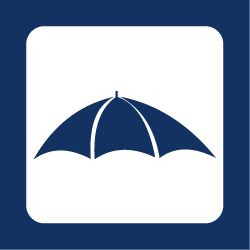Let's Break Down Home Insurance...
Homeowner’s insurance isn’t required by law; however, if you have a mortgage on your home then the lender will most likely legally require you to have an insurance plan that insures 100% of the home’s replacement cost until your home loan is paid in full. If you currently own your home you are technically not required to have home insurance coverage by law. For most homeowners however, having home insurance coverage is a no-brainer as it insures you can avoid substantial financial loss to one of your greatest assets should something happen to it.
Lets Break Down The Basics
Home insurance coverage can vary from plan to plan. The most common events that you will be covered from under a homeowner insurance policy include protection from property damage such as fire, lightning strike, hurricanes, wind storms, hail storms, and water damage (usually from busted pipes). Some natural disaster damages are not included under a regular policy such as earthquakes, mudslides, and flood damage.
When you need to protect an important lifelong investment such as your home, it is best to research different home insurance quotes online. As a new or existing homeowner, when you can review different homeowner insurance plans in one place it ensures you are getting a home coverage plan that is affordable and comprehensive to your specific needs.
Here at SheerQuote, we suggest homeowners compare at least 3 to 4 home insurance quotes from national and local independent insurance providers to make sure you are getting the best home insurance quotes possible. We are here to help you through this process by giving you direct access to multiple free homeowner insurance quotes all in one place.
Depending on home insurance policy specifics, there are a few different types of homeowners insurance form policies and different coverages that your plan will likely include as seen in the chart below:
| Types of Home Insurance Coverage: | What Does this Insurance Cover? |
|---|---|
| Dwelling: | Dwelling insurance covers any damage to the home or attached building structures such as a garage or home’s front porch. |
| Personal Property: | Personal property liability covers paying for replacement or repairs to any belongings that are damaged and or stolen in certain events covered under your policy. |
| Other Structures: | This coverage takes care of any other structures that are stand-alone detached entities on your land such as a tool shed, fence, pool, or mailbox. |
| Liability: | Personal liability reimburses you for any legal action taken on you for accidental injury or property damages to others that occur on your property. |
| Additional Living Expenses (ALE): | ALE coverage reimburses the costs associated with being displaced from your home such as temporary lodging, food purchase, and other living expenses occurred when your home is unavailable to live in. |
| Medical Payment: | Medical payment coverage protects against any costs of minor injuries that someone not living on the property sustains while visiting. |
- House age and materials used: The older your house, the higher the risk of losses or damages from general deterioration or from external factors like harsh weather conditions. Houses made of lightweight materials, like wood, will be more likely to get damaged than houses made from brick, stone or cement. The state of the roof on your house needs to be considered too because if replacement or repair is needed, the costs of labor and materials increase with time.
- Home security: Having an efficient home security system in your house has a two-fold effect – it can reduce your insurance premium while also giving extra protection to your family and your possessions against theft and vandalism. Updating the locks in your home can help in reducing the cost of your premium, as can installing fire alarms or sprinkler systems.
- House renovations: If you have done or started any renovations to your home, you have added value to your home. Some renovations that add value include updating pipes or adding additions. Make sure you advise your homeowners insurance provider as these new improvements need to be accounted for in your policy and premium rates.
- Home Location: If your home is in an area that is prone to natural disasters you can expect to pay a higher premium from the risk associated with that location. You may also want to check out if your ZIP code carries higher premiums. ZIP codes with higher numbers of theft claims, for example, could hike your insurance premiums up 3-5 percent.
There are many factors to consider when thinking about home insurance. Getting the right information and putting together a personalized, affordable plan for your home can only be done by the licensed insurance agents. It only takes a few minutes of your time to get your free homeowner’s insurance quote. Contact us today to compare multiple insurance quotes or chat about your options.

